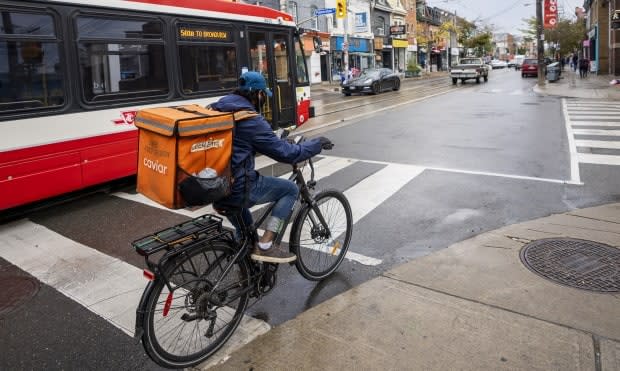Why this Uber Eats bike courier is at the centre of a dispute over gig workers' rights in Ontario

An Uber Eats bike courier is at the centre of a dispute over the difference between an employee and an independent contractor in Ontario — with critics saying a labour ministry ruling in his case contradicts a new bill laying out the rights of gig workers.
Saurabh Sharma asked for help from lawyers and the union Gig Workers United after Uber clawed back almost $200 of his earnings last August due to a technical error on the app.
"I felt so helpless," Sharma, 28, told CBC News.
"There is no boss — your boss is the app."
The Ontario Ministry of Labour ruled late last month that Uber maintained sufficient control over Sharma's working conditions that he was an employee rather than an independent contractor, and that his working hours included all the time he spent delivering orders and waiting for work.
But the Working for Workers Act, introduced by Ontario Labour Minister Monte McNaughton on Monday, provides all gig workers a $15/hr minimum wage only for "engaged" time spent making a delivery or transporting a passenger. Critics say the proposed bill is in direct conflict with the ruling in Sharma's case and that the Progressive Conservative government is trying to deny gig workers rights that the ministry's decision suggests they're entitled to.

The ruling and the legislation are "contradictory," says Ryan White, Sharma's lawyer.
White says the Ford government's message to gig workers through the bill is: "'You're starting from nothing, and we're giving you some things,' when in fact, the inverse is true."
'They had nothing to say'
Sharma, a permanent resident and a law student who began working as an Uber Eats bike courier in 2020, was doing both full-time and part-time shifts to help pay the bills.
He says trying to find a resolution through Uber was demoralizing.
"I tried chatting with support [staff] and they had nothing to say. They couldn't help me," he said, although he told CBC News the company did eventually offer to refund the money after he filed his complaint with the labour ministry.
After an Employment Standards officer reviewed his case and ruled Uber exercised control over his work, the app he uses for orders, and the amount of profit he makes, the ministry found the company contravened a dozen rules outlined in the Employment Standards Act.
Uber was ordered to pay back almost $1,000 in wages. Brice Sopher, vice president of Gig Workers United, says the union pushed for a resolution because cases like Sharma's case are a common occurrence.
"We knew we had to do something, because we could only imagine how many other workers that that happened to." Sopher said.
Uber plans to appeal
In an email statement to CBC News, Uber confirms it's planning to appeal the Ministry of Labour's decision.
"This finding does not change the status quo — in which drivers and delivery people are independent contractors," the statement reads.

The company says the ruling "goes against" other findings from the same ministry and similar agencies in Canada that see Uber drivers and couriers as independent contractors and not employees.
But White says while he's aware these rulings exist, many of the workers involved might not have had the resources to fight a company as large as Uber.
"It wasn't the kind of thing where if we went to the Ministry of Labour, that it was going to be a single worker up against a multi-billion-dollar multinational, but it was going to be Saurabh supported by Gig Workers United and supported by counsel," White said.
Ruling applies only to Sharma, ministry says
The Ministry of Labour says since its decision could go before the Labour Board for appeal, the ministry needs to remain impartial, and that the ruling applies solely to Sharma and not to other gig workers.
Meantime, McNaughton says the legislation is still sound, and that the Ford government is working to bring other benefits like dental and health care to precarious workers.
"By providing drivers and couriers with these protections, we're raising the floor, not setting the ceiling," McNaughton told CBC News in an email statement.
"Nothing is preventing a 66-billion-dollar company from providing their workers with higher pay, vacation time, or other protections, tomorrow, if they chose to do it."


